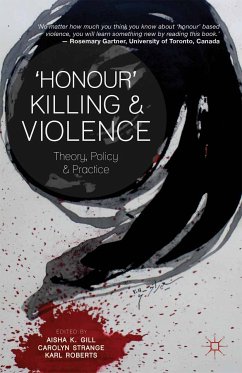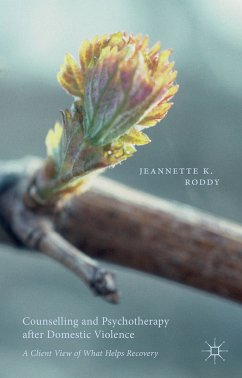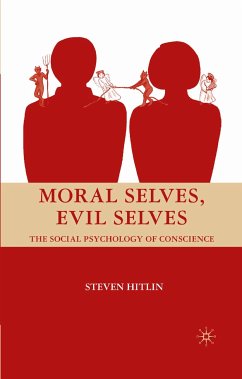
eBook, PDF
'Honour' Killing and Violence (eBook, PDF)
Theory, Policy and Practice
Redaktion: Strange, C.; Roberts, K.

PAYBACK Punkte
34 °P sammeln!






In this interdisciplinary collection leading experts and scholars from criminology, psychology, law and history provide a compelling analysis of practices and beliefs that lead to violence against women, men and children in the name 'honour'.
Dieser Download kann aus rechtlichen Gründen nur mit Rechnungsadresse in A, B, BG, CY, CZ, D, DK, EW, E, FIN, F, GR, HR, H, IRL, I, LT, L, LR, M, NL, PL, P, R, S, SLO, SK ausgeliefert werden.
Anja Bredal, Institute for Social Research, Norway Selen Ayirtman Ercan, University of Canberra, Australia Dana Mohammed Olwan, Simon Fraser University, British Columbia Rupa Reddy, School of Oriental and African Studies (SOAS), UK Jocelynne A. Scutt, University of Buckingham, UK Suruchi Thapar-Björkert, University of Uppsala, Sweden
Produktdetails
- Verlag: Palgrave Macmillan UK
- Seitenzahl: 244
- Erscheinungstermin: 7. Mai 2014
- Englisch
- ISBN-13: 9781137289568
- Artikelnr.: 44902713
"The result is an interdisciplinary, comprehensive and unique collection which will provide practitioners, women's groups, development workers, policy-makers, academics, students and researchers with a range of ideas and analyses on which to draw. ... this book is an extremely useful addition to the academic and policy literature and to engendering social change for women across the world in terms of the horror of 'honour' violence and killings." (Gill Hague, Gender & Development, Vol. 23 (3), November, 2015)
'Honour' Killing and Violence is an important resource for academics, practitioners and students working in the areas of gender-based violence internationally and within Britain. This well-written volume provides coverage of a
'Honour' Killing and Violence is an important resource for academics, practitioners and students working in the areas of gender-based violence internationally and within Britain. This well-written volume provides coverage of a
Mehr anzeigen
number of important issues and contexts, including law and policy; and community and state responses in Britain, Europe, India and North America. It also benefits from its interdisciplinarity: the contributors use skills from a range of academic disciplines, including history, economics, law, criminology and psychology, to look at this issue, and together they provide a coherent and timely dialogue that will provide fresh and fascinating insight into the topical issue of 'honour' killing and violence.' Dr Geetanjali Gangoli, Centre for Gender and Violence Research, University of Bristol, UK
'The chapters in 'Honour' Killing and Violence bring an invaluable, interdisciplinary perspective to a topic that incites debates characterised more by heat than light. The contributors to this volume do not shy away from these controversies, which is what makes it so timely. At the same time, they do not allow those controversies to limit their analyses to well-trodden ground and blind alleys, which is why the volume is so illuminating. The chapters rely on original empirical evidence and argumentation informed by anthropology, criminology, legal reasoning, history, political science and psychology to urge a multilevel, multicausal approach to understanding honour violence and responses to it. No matter how much you think you know about 'honour'-based violence, you will learn something new and question some of your assumptions about it by reading this book.' Professor Rosemary Gartner, Centre for Criminology and Socio-Legal Studies, University of Toronto, Canada
'A worldwide investigation into a worldwide problem Gill, Strange and Roberts' collection is an excellent place to learn about current international efforts in the area of 'honour' killings and violence.' Professor Nicole Westmarland, Co-Director, Durham Centre for Research into Violence and Abuse, University of Durham, UK
'The contributions in this book skilfully analyse the intersectionality between gender, discrimination, violence and cultural notions of honour, and their interrelatedness in the killings of women. Gender-related killings are not isolated incidents that arise suddenly and unexpectedly, but are often the ultimate act of violence in a continuum of gender-based discrimination and violence.' Ms Rashida Manjoo, United Nations Special Rapporteur on Violence against Women, South Africa
'The chapters in 'Honour' Killing and Violence bring an invaluable, interdisciplinary perspective to a topic that incites debates characterised more by heat than light. The contributors to this volume do not shy away from these controversies, which is what makes it so timely. At the same time, they do not allow those controversies to limit their analyses to well-trodden ground and blind alleys, which is why the volume is so illuminating. The chapters rely on original empirical evidence and argumentation informed by anthropology, criminology, legal reasoning, history, political science and psychology to urge a multilevel, multicausal approach to understanding honour violence and responses to it. No matter how much you think you know about 'honour'-based violence, you will learn something new and question some of your assumptions about it by reading this book.' Professor Rosemary Gartner, Centre for Criminology and Socio-Legal Studies, University of Toronto, Canada
'A worldwide investigation into a worldwide problem Gill, Strange and Roberts' collection is an excellent place to learn about current international efforts in the area of 'honour' killings and violence.' Professor Nicole Westmarland, Co-Director, Durham Centre for Research into Violence and Abuse, University of Durham, UK
'The contributions in this book skilfully analyse the intersectionality between gender, discrimination, violence and cultural notions of honour, and their interrelatedness in the killings of women. Gender-related killings are not isolated incidents that arise suddenly and unexpectedly, but are often the ultimate act of violence in a continuum of gender-based discrimination and violence.' Ms Rashida Manjoo, United Nations Special Rapporteur on Violence against Women, South Africa
Schließen
Für dieses Produkt wurde noch keine Bewertung abgegeben. Wir würden uns sehr freuen, wenn du die erste Bewertung schreibst!
Eine Bewertung schreiben
Eine Bewertung schreiben
Andere Kunden interessierten sich für











